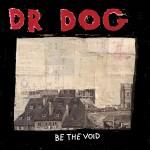
Dr. Dog Be the Void
(Anti)
What have you done in the past 10 years? If you’re Philadelphia-based quintet Dr. Dog, you’ve exited the womb, lost your baby band members, endured some awkward formative years, developed an adolescent identity, suppressed that identity to fit in with the cool kids, realized the cool kids aren’t that cool, and learned to embrace the quirky, enjoyable person you’ve always been. Oh, and you’ve earned a PhD somewhere along the way.
The Dr. debuted on 2002’s Toothbrush. A decidedly lo-fi affair, the album introduced (very small) audiences to the retro-rock eccentricities and general idiosyncrasies that would characterize the band’s more recognizable work. Most importantly, though, it caught the attention of My Morning Jacket and earned the embryonic outfit an opening gig on two major tours. The three LPs that followed followed the same helter-skelter formula that found the band wrestling their 700-lb gorilla of feral creativity into a more submissive position.
In the fifth round, 2010’s Shame, Shame, Dr. Dog tagged in established producer Rob Schnapf (Beck, Elliott Smith) to guide what would be, by far, the biggest budget effort of their career, and his presence was intended to influence far more than just recording fidelity. Some saw it as the definitive moment where Dr. Dog “sold out,” but Schnapf’s influence was more positive than negative. He distilled, centered, and packaged the band’s marketable elements into a readily consumable, neatly-wrapped product. He emphasized the delightfully disparate voices of dueling frontmen Toby Leaman and Scott McMicken, splitting their vocal duties across numbers but featuring the group’s iconic harmonies at every available opportunity. The arrangements were tighter, more melodic, and more memorable throughout. Critics praised the album as the group’s best yet. Rob Schnapf proves, they said, that it is possible to teach an old dog new tricks.
Still, there was a common gripe. The 700-lb gorilla had been tranquilized to the point that it no longer felt dangerous or even mildly unpredictable. In attempting to package Dr. Dog’s product, much of the band’s indefinable, oddball charm had been disappointingly omitted.
Now, enter Be the Void (and exit Rob Schnapf). With that minimalistic moniker, you’d expect Shame, Shame’s distillation and purification process to continue en route to radio-readiness. But, oddly, it doesn’t. As soon as the stomp-clap beat of opener Lonesome meets its twangy slide-guitar riff, any concern for a creative void is banished. The nifty fretboard work and driven drums on These Days envisages the band on a jet-propelled voyage through stoner-space and does a better job than perhaps anything thus far in conveying the tremendous energy of their live shows. Do the Trick is flush with harmony and considers (lyrically) just how many words can rhyme with the title noun. Then there’s the 1-2 punch of Vampire and Heavy Light to show off the band’s broad stylistic range. On the heels of a bluesy, gritty ballad evoking rock’s golden age comes a syncopated bongo-beat underlying an island-boogie aesthetic. It’s a ferocious contrast that could stem the flow of most albums, but the distinct, familiar tone and harmony from both vocalists somehow instills a sense of continuity.
All this praise isn't to say that Be the Void is a flawless effort. Warrior Man is a strikeout of sorts and suggests that a David Bowie cover of I am the Walrus wouldn’t be so interesting after all. A clever concept, it proves anemic in execution and shouldn’t have made the album, let alone occupy its longest timeslot at roughly 5 minutes. The great thing is, though, it’s forgivable. On nearly every number, Dr. Dog “goes for it” in some manner, and hits more often than not. I’ll take mild inconsistency over image-conscious conservatism every single day.
Displaying positive direction and a newfound wisdom from their stint with big-time production, Be the Void is Dr. Dog’s best effort yet. After 5 previous LPs, the band sounds confident and comfortable for the first time. They’ve come a long way in 10 years, and Be the Void gives reason to believe the next 10 will be better still.
15 February, 2012 - 08:50 — Benjamin Jones